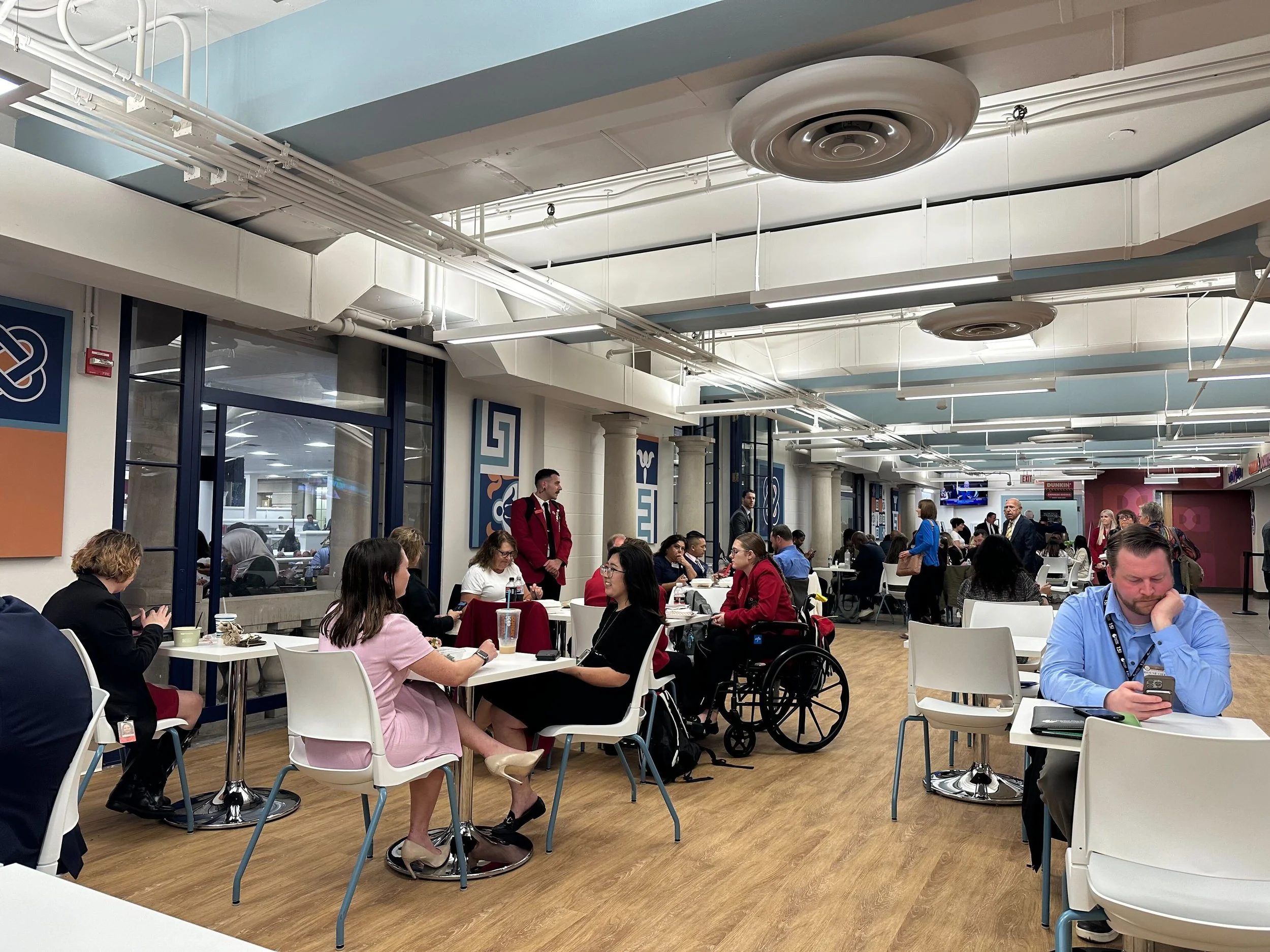Support for Staffers from Inside and Out
Welcome to the third edition of POPVOX Foundation’s “Future-Proofing Congress,” a monthly newsletter that highlights modernization wins, new tech tools, professional development opportunities, and constituent engagement initiatives for busy Congressional staffers.
This month we’re covering:
continued Congressional capacity questions post Chevron,
progress on the Capitol ADA drop-off zone,
House remote voting proposals,
a behind-the-scenes view of the appropriations process,
cybersecurity tips,
and more!
We know that October of an election year is a weird one in the halls of Congress, but also that January – with its revived policy agendas and new Congress growing pains – will be here before we know it. As recovering staffers from both sides of the aisle, we’ve been in your shoes, trying to keep up with all that’s happening while also staying current on how Congress works and is modernizing. Our goal is to make your life easier, so please don’t be shy about reaching out if you have any questions or suggestions on how we can improve this newsletter.
Warmly,
Aubrey Wilson
Director of Government Innovation
Taylor J. Swift
Director of Government Capacity
Investing in Congressional Capacity Post Chevron
The media is shining a light on why rebuilding Congressional capacity (and giving you more resources to do your job effectively) is especially important after the Loper Bright ruling. Bookmark these for when you have time for a long read/listen:
“How Congress Gets its Groove Back” in the American Prospect by Executive Editor David Dayen
“Congress Needs to Invest in Itself” in Matt Yglesias’ “Slow Boring” Substack by Ben Knauss
“Reestablishing Congressional Oversight of Federal Regulations,” a Federalist Society op-ed by Federation for American Innovation’s Dan Lips
And ICYMI, last month’s newsletter highlighted new court cases challenging regulations post Chevron, and what it means for your work.
Progress on the Capitol ADA Drop-Off Zone
The House is making progress on improved accessibility with construction of the new ADA Drop-off / Pick-up Zone at the Capitol due to finish in December. This initiative marks a significant step toward making the Capitol more accessible to all, especially for individuals with disabilities who have long faced challenges navigating a campus designed in the 1870s. Kudos to the AOC and everyone involved in this important modernization effort!
Making the Case for Remote Voting During Personal or National Emergencies
Rep. Brittany Pettersen [D, CO] testified in the Rules Committee Member Day Hearing last month asking Congress to change House Rules so Members on parental leave can continue to do their jobs, even if they can’t be in DC to cast a vote. We couldn’t agree more (which is why we included a similar recommendation in our House Rules report prior to the hearing).
House lawmakers have missed hundreds of votes in the 118th Congress due to maternity and paternity leave, personal health reasons, and other family emergencies. These votes matter. In an era in which technology allows for unprecedented connectivity, there is no reason why Congress should not embrace remote voting as a means to enhance both participation and representation — with proper safeguards against abuse. Other legislatures, like Canada and the UK, have successfully adopted similar reforms.
Behind-the-Scenes View of the Appropriations Process
September 30 marked the (theoretical) end to FY2025, but Congress passed a continuing resolution (CR) to fund the government until December 20, setting up a Lame Duck Approps sprint. Since FY1977, Congress has relied on CRs to temporarily fund the government in all but three years.
House Approps Chair Cole [R, OK] and Interior Subcommittee Chair Simpson [R, ID] recorded a super informative “behind the scenes” look at all things Approps while “Ranking Rizzler” DeLauro [D, CT] released her own ode to a “dark academia Congress era.”
Can’t get enough Approps? Check out this virtual briefing tailored for junior staff that our team hosted with the Modernization Staff Association earlier this year.
Supporting Disaster Casework Surge Capacity
Congressional district and state staff play a crucial role in disaster relief efforts, working alongside federal agencies to support constituents during crises. These staff members communicate vital information like relief program application deadlines and shelter locations, prioritize urgent cases through direct Congressional liaisons, and help constituents navigate bureaucratic snafus like inconsistent documentation requirements to access essential benefits and services. Their on-the-ground experience also provides valuable insights for future disaster response oversight.
However, the experience of handling these disasters can be a major challenge. Due to caps on the number of staff each office can have, caseworkers often are faced with disaster-related cases on top of their already heavy caseloads. This cycle of recurring disasters contributes to burnout and the loss of experienced staff, ultimately impacting constituent services.
Two potential solutions exist to better support caseworkers. READ MORE
Revamped Seating at Longworth Dunkin' Donuts Gives Staff a New Meeting Place (Photo by POPVOX Foundation’s Danielle Stewart)
AI on the Hill
CAO AI Policy
The CAO recently announced the establishment of the House’s first AI policy (HITPOL 8) via e-Dear Colleague, now reflected in POPVOX Foundation’s “Where the House and Senate Are on Internal AI” resource. The policy is posted on HouseNet and available to Congressional staff behind the House’s firewall. CAO and the Committee on House Administration will update the policy annually. And we will have an in-depth review of the policy in next month’s newsletter.
Deepfake Targets Senator
Uh oh. In late September, Senate Foreign Relations Committee Chair Sen. Ben Cardin was targeted on a video call with a deepfake impersonation of a former Ukrainian Minister of Foreign Affairs. Luckily, the Senator and his staff noticed the caller was acting suspiciously and acted quickly to end the call and notify authorities. But episodes like this underscore how important it is for Members and staff to follow basic cybersecurity principles.
Not So Fast, Chatbot Candidate
A Congressional candidate challenging Rep. Beyer [D, VA] announced that he would debate a chatbot trained on the Congressman’s position statements (for which he open sourced the code). OpenAI later suspended access to the company’s API for violating the company’s ban on political uses. The candidate then connected the platform to an open source AI model and announced that he will soon release “PotusGPT.”
Security Tip of the Month
Cyber threats and data breaches have become all-too-common, compromising Hill staffers’ personal privacy. In fact, thousands of Congressional staff recently had their personal information leaked across the dark web. It all adds up to the need to be proactive about securing your personally identifiable information.
This Cybersecurity Awareness Month, take the time to protect yourself:
At the very minimum, use strong passwords and don’t use the same password for every account.
Even better: use a password manager.
Go for the gold: activate two-factor authentication (2FA) or multi-factor authentication (MFA) on your online accounts.
If you ever need help or have concerns about potential phishing or hacking attacks, the Technology Service Desk is available 24/7 at 202-225-6002.
The Comparative View - Inspiration from Parliaments Around the World
Caribbean Members of Parliament gathered in Miami last month for a forum on "The Role of Parliaments in Transforming Digital Economies in the Caribbean." Organized by the House Democracy Partnership, USAID, the Caribbean Community Secretariat (CARICOM), and ParlAmericas, with support from IRI and NDI, the event brought together lawmakers and experts to explore strategies for enhancing digital transformation in the region. READ MORE
Legislators from around the world gathered in Geneva for the 149th Inter-Parliamentary Union General Assembly, with a focus on AI, science, and technology. The IPU also released its 2024 “World E-Parliament Report,” which chronicles accelerating digital transformation in legislatures globally. Key findings include:
68% of parliaments now have multi-year digital strategies and 73% have formal modernization programs.
29% of parliaments now use AI in some form, up from 10% in 2020.
70% of parliaments have adopted national cybersecurity standards and 53% have internal cybersecurity strategies.
Only 35% of parliaments have a formal strategy for online public participation.
For more news on international legislative experiences, please subscribe to our Modern Parliament (“ModParl”) newsletter.
Stay in the Game
The final months the 118th Congress will likely be jam-packed. If you find yourself feeling stressed, know you are not alone. Call the Office of Employee Assistance (202-225-2400 for House staff and 202-224-3902 for Senate) for free professional counseling and help with personal, behavioral, substance abuse, and stress-related difficulties. And CAO’s House Center for Well Being (at wellbeing.house.gov in-network) has on-demand fitness classes, well-being apps, and coaching for career transitions, to name just a few.
Do you have a favorite self-care tip you’d like to share? Email us!
Shout Outs & Events
POLITICO previewed SalarySense, which lets managers filter anonymized real-time payroll data from House personal offices and committee staffs to see what the going rate is for different roles. (We’ll have more on this tool next month!)
Future Caucus’s new On the Rise report analyzes the trends and demographics behind Millennial and GenZ candidates for Congress.
AEI’s Kevin Kosar discussed the importance of the Congressional Research Service and its new director, Karen Donfried.
Former Rep. Donna Edwards [D, MD] and Issue One’s Joshua Manuel Bonet make the case for “How Modernizing Congress Would Heal Dysfunction” in the Democracy Journal.
Redditors! Did you know there’s a r/Congress (started by journo Pablo Manríquez)?
Former US Deputy CIO Jen Pahlka and FAI’s Sam Hammond agree on the need for increased state capacity.
ICYMI: The Society for the Rule of Law held a webinar covering Congressional dysfunction and possible paths to reform.
Apolitical is looking for examples of government folks using AI as they carry out their gov roles.
Imagine if the US Capitol were designed, built, and maintained by the Chinese government. For several African nations, that’s not a hypothetical.
The Future is Now
ICYMI: The “.io” URL extension may soon go away after the UK turned over control of its “Indian Ocean” territory to Mauritius.
In its fifth Starship test flight, SpaceX returned the rocket's first stage booster back to its launch pad for the first time for a “chopstick catch” with giant mechanical arms.
Anthropic CEO Dario Amodei outlined an ambitious vision of AI curing disease, reducing poverty, and strengthening democracy over the next decade.
With the Supreme Court declining a lower court appeal arising from the Silk Road case, the US Treasury now officially holds ~$4.4 billion in Bitcoin.
Senate EAP Therapy Doggos in the Senate Press Gallery (via @igorbobic)
About POPVOX Foundation
POPVOX Foundation is a 501(c)3 nonprofit organization with a mission to inform and empower people and make government work better for everyone. POPVOX Foundation is focused on ensuring that democratic institutions are equipped to address the “pacing problem” — the gap between emerging technologies and governance.

















